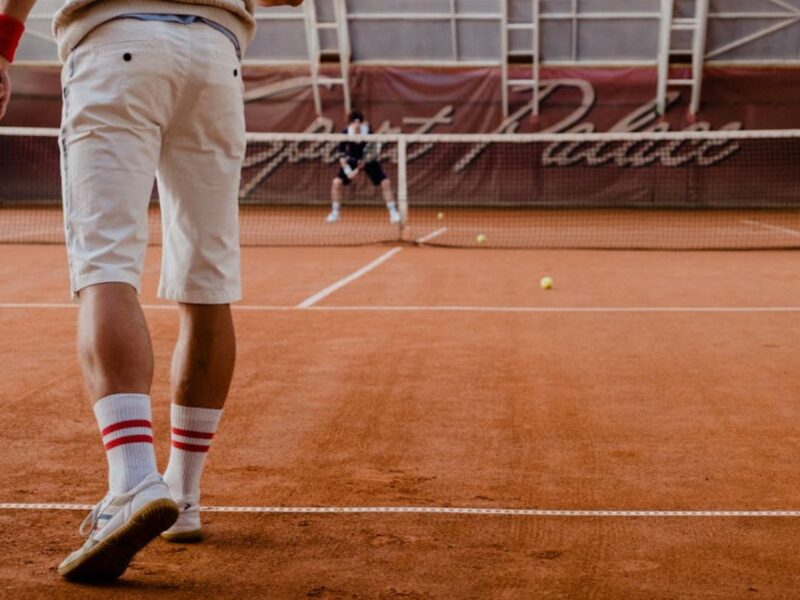As well as being an intense physical pursuit, tennis is a game characterised by effective problem-solving. Every point presents a fresh puzzle, demanding swift calculations and measured risk-taking—all while keeping a cool head under pressure. If you’ve ever found yourself outmaneuvered by an opponent who seems to anticipate your every move, you’ll know that success isn’t just about how cleanly you strike the ball. Mental agility matters just as much as physical fitness in this game.
Elite players dedicate hours to sharpening their tactical awareness, but what if some of that mental conditioning could happen away from the court? Strategy games—whether played with cards, on a board, or through a screen—are surprisingly effective ways to develop the cognitive endurance and decision-making skills you need to power through the rankings. Video games, chess, and even poker all have lots to offer when it comes to improving your ability to think several moves ahead.
Let’s explore how engaging with these games can directly translate to better performance on the tennis court.
The Strategic Nature of Tennis
At its core, tennis is a sport requiring excellent pattern recognition skills and tactical execution. The best players construct points throughout a match, just as a grandmaster does when setting a trap on the chessboard. Each shot carries consequences, opening up angles, exposing weaknesses, or baiting an opponent into an error.
Success in the game, then, depends on calculating risk, emotional control, and being able to make the right decision under intensive pressure. If you can recognize an opponent’s tendencies early on, you’ll gain an enormous advantage…
The challenge of the game isn’t just about identifying patterns; adaptability is essential, too. You might have a concrete game plan in place, but your opponent isn’t a static target. The ability to shift gears mid-match, much like adjusting strategy mid-game, separates strong players from the truly great ones.
Can Poker Enhance Performance?
Intrigued? Let’s take a look at the core strategy games that can upgrade your performance on court…
Beginning with poker. Whether played solo in its online format or with your club buddies post-training, when you strip away the high-stakes nature of the game, poker becomes an exercise in pure strategic decision-making. The similarities with tennis are hard to ignore: should you play aggressively, or is bluffing a better tactic to try?
The game forces you to assess probabilities and calculate risk in real-time, much like deciding whether to attack a second serve or play a high-percentage rally ball. Ask any seasoned poker player, and they’ll tell you that overcommitting to a hand without considering all the other elements at play leads to certain disasters. Can you find a parallel here with tennis? Learning to manage risk in a poker game, even if you’re just playing for points, cultivates the gray matter needed for making smarter shot selections on the court.
Then, there’s the mental discipline the game cultivates. In poker, staying composed after a loss is crucial, just as it is in tennis when you lose a breakpoint. Tilt—a poker term for losing emotional control and making rash decisions—can be devastating in both games. If you can master the art of keeping your emotions in check in a challenging poker setting, you’ll be better prepared to keep your cool when a match gets tight.
Strategic Games to Add to Your Training
So poker’s not in your wheelhouse? There are plenty of other games that can bring benefits to your game in abundance.
Chess, for instance, might just be the ultimate test of a long-term strategy. The outcome of high-level matches can depend on a player’s ability to think several moves ahead and their ability to execute that by constructing sequences to set up future attacks. Tennis players can benefit from cultivating a similar mindset. It’s not just about winning the current shot, but what do you need to do to maneuver your opponent into a vulnerable spot several points down the line?
Chess teaches patience and foresight, but even the right video games can hone your reflexes and facilitate rapid decision-making. Real-time strategy games, in particular, ask players to fulfill a variety of tasks, including managing resources, predicting enemy movements, and executing tactical shifts. It’s a level of chaos not unlike what you’ll experience during unpredictable rallies.
Making Room in your Schedule
We know that the best athletes leave no stone unturned in pursuit of a competitive edge, so why not incorporate strategy games into your schedule? This doesn’t mean replacing those all-important physical training sessions, but simply dedicating time (perhaps after training or while you travel) to these cognitive ‘workouts.’
Our top tip? Map out mental training goals to support your match-specific ones. If you struggle with shot selection under pressure, poker can be a way to practice risk evaluation. If your weakness lies in constructing points, then chess has the potential to improve your ability to plan sequences. Even fast-paced video games could help you build sustained attention if you notice a lapse in focus.








